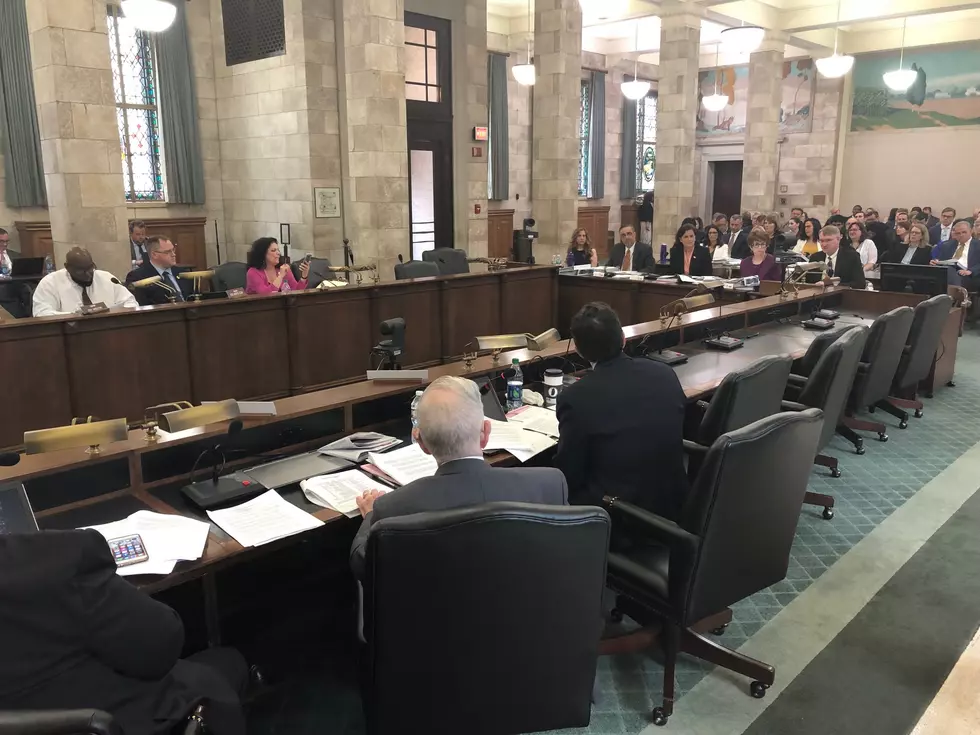
Tax collections surge, but Murphy still wants millionaires tax
TRENTON — Income tax collections surged to a record in April, as shortfalls recorded in December and January proved to be merely delays, not a disappearance.
Despite that – or perhaps in part because of it, as the revenue is evidence that raising income taxes on the rich didn’t kneecap collections – Gov. Phil Murphy isn’t backing away from what his administration calls a "true millionaires tax" or plans for a new $250 million property tax relief program.
Both the tax hike and the new tax credit have been coolly received by lawmakers, who also expressed hesitation about putting $317 million from this year’s unexpected tax collections into the long-empty “rainy day” surplus fund.
State Sen. Paul Sarlo, D-Bergen, questioned how the Murphy administration can justify its push for a millionaires tax when revenues are already beating expectations.
“I’m being as blunt as possible. You have two legislative leaders saying we’re not going to move forward with a millionaires tax,” Sarlo said.
Treasurer Elizabeth Maher Muoio said nearly half of this year’s corporate tax growth, $721 million, is a one-time revenue that won’t recur next year, when state spending is projected at nearly $39 billion. Some other revenue also won’t repeat, too, as it was collected through a tax amnesty program.
“You’re being blunt,” Muoio said. “The most blunt thing I look at every day are our expenditure needs going forward throughout the years.”
The Murphy administration is increasing its outlook for how much revenue it expects from increasing income taxes on the rich: $350 million this year from people making $5 million or more, or $75 million than first thought, and $536 million next year if it also applies to income above $1 million, which is $89 million more than first forecast.
Overall income tax collections were down 35% in December from the same month a year earlier and down 5% in January. It is apparent that’s because taxpayer behavior has changed due to the new limit on how much in state and local taxes qualifies for a federal tax deduction. People didn’t feel compelled to pay their state taxes by Dec. 31 to secure a bigger credit on April tax returns.
Instead those payments to the state were made in April, pushing final payments nearly 82% higher than a year earlier. In all, April income tax collections were 57% higher than one year earlier – at $3.627 billion, far more than the April 2008 record month of $3.14 billion.
The corporate business tax is also yielding record revenues forecast at $3.8 billion this year, almost 65% higher than a year earlier. That’s in part because the tax base expanded due to change in the federal tax laws and in part because of a temporary surcharge approved last year by the state.
Overall tax collections are now forecast to exceed expectations from last July by $720 million, and the Murphy administration says state law in turn requires $317 million into the Surplus Revenue Fund – the “rainy day fund” that was emptied in fiscal 2008 and hasn’t been replenished since.
“Everyone is taught the importance of saving for a rainy day, and that fundamental lesson is also embodied in our laws,” Muoio said.
Muoio said the rainy-day fund is meant to protect state services and benefits in the event of an economic downturn. She said it had a $735 million that was entirely drawn down in one year when the Great Recession hit.
“So it is absolutely crucial that these funds remain in a lock box,” Muoio said. “We have to prepare for forces both inside and outside of our control.”
Lawmakers seeking to avoid Murphy’s $647 million in proposed tax increases might see it differently. Sarlo suggested the budget bill can trump that law – a point Muoio doesn’t dispute.
“If the Legislature decides that, can budget language override that statute? Every budget is its own law, so …” Sarlo said.
“Yeah, if that’s what the Legislature determined,” Muoio said.
The proposed budget for next year is now $38.9 billion. Added to it is a proposal to increase direct property tax relief in next year’s budget by $250 million would be in the form of a new, one-year program, rather than the existing homestead credit or Senior Freeze.
“It would be administered through their gross income tax form that they file in April and it would be a one-time refundable tax credit,” Muoio said.
Muoio said the program’s details are being determined, such as income eligibility thresholds, but that would benefit over 1 million taxpayers. It would require legislation to enact it, and Senate President Steve Sweeney has already rejected the idea as a gimmick.
New Jersey: Decoded cuts through the cruft and gets to what matters in New Jersey news and politics. Follow on Facebook and Twitter.
Michael Symons is State House bureau chief for New Jersey 101.5 and the editor of New Jersey: Decoded. Follow @NJDecoded on Twitter and Facebook. Contact him at michael.symons@townsquaremedia.com
More From New Jersey 101.5 FM









